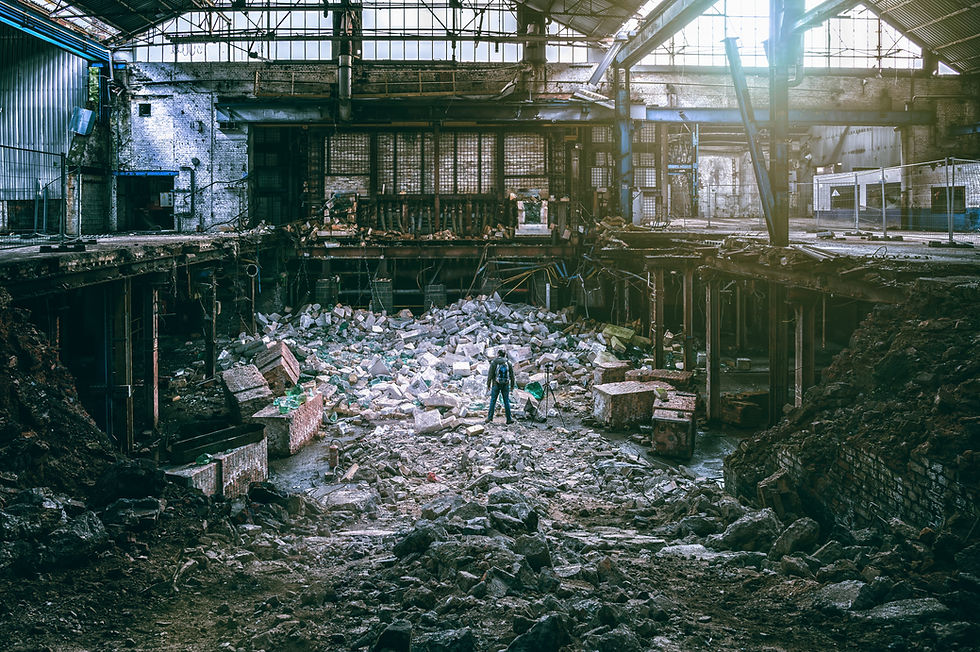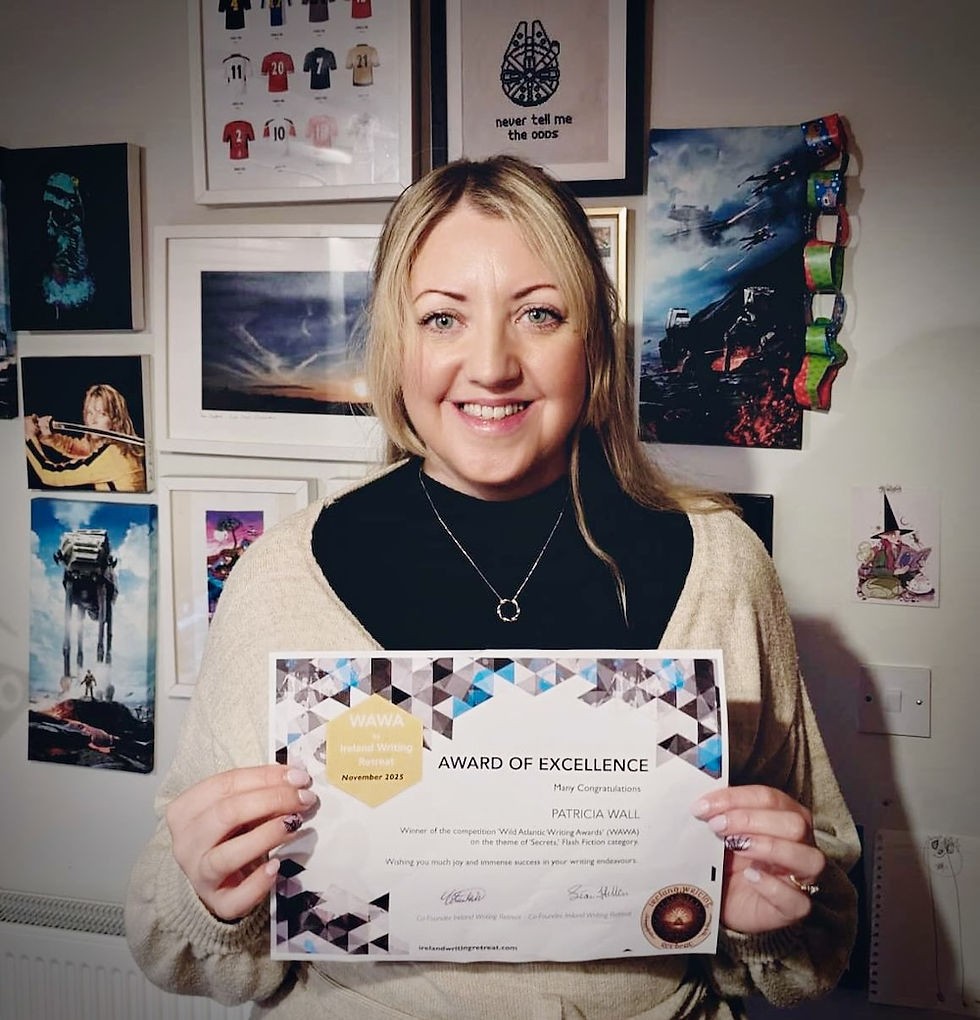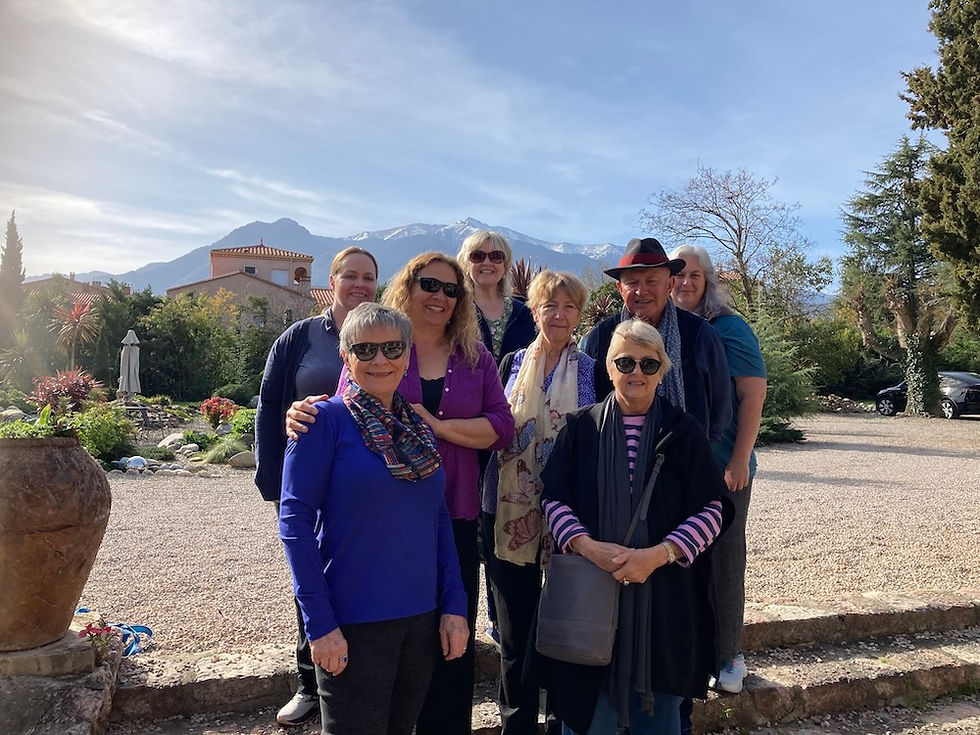WAWA Stories And The Writers Behind Them
- columbiahillen

- Feb 12, 2024
- 11 min read
Ireland Writing Retreat is delighted to highlight some of the finalists in a previous ‘Wild Atlantic Way Awards’ (WAWA) competition on the theme of ‘Hope.’
Stay tuned, winners and finalists of our latest WAWA competition on the theme of ‘Change’ will be announced later this month.
Mother of a child with autism, Jennifer Berger from New York, wrote a poignant story, A Loving Gamble, about bringing her child to a residential school for the first time that earned her a finalist place in creative nonfiction.

“The past fifteen years have been spent attending to my son Josh who has autism,” said Jennifer, who lives in Queens with her husband, Aaron. “Writing through the decision and experience of sending him to a residential school has been both healing and painful, and has required a practiced awareness of remaining vulnerable without oversharing.”
About her writing experiences, she added, “I’ve loved writing since childhood and have always wanted to be a writer in some capacity. Now at the age of 50, I’m starting to realise that dream one small step at a time. A challenge for any writer of memoir or creative non-fiction is to maintain objectivity, and that is something I work at through several revisions when writing of my circumstances.”
She added, “Since our son’s departure writing, I’ve been reading, healing, taking life one day at a time, and waiting to see what the future holds for our family of three. Being selected as a Wild Atlantic Writing Awards finalist has been encouraging and has further motivated me to keep practicing my craft.”
A Loving Gamble
by Jennifer Berger

The December weather reflects my mood: icy, dingy, grey.
My husband, Aaron, drives. I sit in the backseat with our son, Josh.
We’ve prepared him for this moment as much as possible upon his acceptance to this school, a five-hour drive from our home. I haven’t prepared myself at all. I’ve cried, litigated, and won…all physical manifestations of emotional trauma from needing to place my 15-year-old with autism in a residential setting to help him achieve the basic life skills he so desperately needs. I sobbed myself to sleep in our hotel room the night before while Josh snoozed soundly wearing a black, V-necked nightshirt that was mine until he claimed it. Another nod to his growing need to assert himself, and my inability to contain it. I countered it with humor as I always do, muttering under my breath that he looked like a character from Little [Whore] House on the Prairie.
We pull up to Josh’s new address, one of a series of small houses each of which contains six students between the ages of 13 and 21. Staff are there to greet us with smiles and paperwork. Those who haven’t yet met Josh comment on his sweet demeanor and bright blue eyes. Puberty hasn’t fully set in yet, something for which I’m grateful; it’s helpful that people still see a version of a boy instead of a man when his frequently inappropriate behaviors don’t mirror those of his neurotypical peers.
We are shown to his room which has already been furnished with items we’ve shipped in advance: clothes in his closet, bedding laid out from home, and framed photos hung of our family of three. Upon the dresser sits a personalised yearbook and social story created by Josh’s former teacher which recounts his previous triumphs, and explains the new challenges that currently lie ahead. I pick it up to read with him; Josh slams it shut and clings to me. We stroke his hair, kiss him, and eventually, with heavy hearts and swollen eyes depart, assuring Josh that we love him and will see him soon. We know, as his former and current staff have repeatedly said, that we’re doing the right thing. But that doesn’t mean it’s easy; it just means that we’re gambling on the belief that Josh has potential that hasn’t yet emerged, but eventually will in a new, more structured environment.
That’s the thing about hope. There are no guarantees. Just a combination of praying for the best and preparing for the worst. A sense of pride and promise in what may seem like an impossible situation, while simultaneously conflicted with the choice you’ve made. And even though no amount of sacrificial love will fix this, it will give Josh his best possible chance at a life of meaning; of living somewhat independently in a world into which he was born, but not meant for. In the end, when it comes to our son, I know that this is indeed a gamble worth taking.
A firm believer in what he terms ‘ruthless editing,’ Paul Bassett Davies was a finalist in the flash fiction category with his story, Watch the Skies. Reflecting his writing skills, he was also winner of our ‘Wild Atlantic Writing Award’ flash fiction category on the theme of ‘Time.’

Paul has accrued considerable experience in the writing field. “I’ve been writing for many years, and I’m now... old. I’m pretty much a full-time writer and there have even been periods when I’ve almost made a living from it, by working in radio, TV, film and the corporate world. In recent years I’ve also been writing novels and teaching writing workshops: one on comedy writing and another on the art of adaptation.”
Describing the evolution of his WAWA story, he said, “The idea emerged from a single image, which is the story’s opening line. I’ve written several versions of this story, most of them shorter than this one, owing to the constraints of many flash fiction competitions, which stipulate a lower word count. I’m a great believer in ruthless editing and feel nearly everything can be made shorter (and should be, in the case of most films), but as I discovered with a successful entry in another competition last year, sometimes your story needs room to breathe. I find that 500 words is a great length for a lot of my flash fiction ideas. My story was originally titled ‘Spudfall’ but I think my final title works better.
On his feelings learning he was a selected finalist, he said, “I was delighted. I enter a lot of writing competitions and this is one of the best. It’s a great opportunity for writers to practice their craft, and maybe even win something.”
Watch The Skies
by Paul Bassett Davies

One morning I noticed a cloud that looked like a tiny potato in an otherwise clear sky. It grew bigger as I observed it. Then a potato hit me in the face.
Two days later a piece of broccoli fell on my head. The following week I was struck by a carrot. Over the next few months I was hit by turnips, Brussels sprouts, onions, leeks, cabbages and parsnips. These events were irregular and unpredictable. When I was out of doors I spent a lot of time looking up at the sky. As a result I walked into various objects and people, including a child whose leg I fractured, and I was knocked down by two cyclists. I also caused a bus to swerve into the garden of a pub. Fortunately it was closed at the time. I became desperate to get to the bottom of what was happening. Meanwhile, I took to wearing a bowler hat.
Not once was I assailed by a tomato. This made me suspect I was not the victim of freakish natural occurrences, such as the rains of frogs or fish one sometimes hears about, but of an intelligent agency, aware that a tomato is classed as a fruit and not a vegetable. As I reflected on this, I had a sudden insight. I began to think – to pray – that the solution to my plight might be in my grasp.
I set about tracing a boy I had bullied at school. I was the ringleader of a little gang who forced him to eat his vegetables after he had stubbornly refused them at lunch on his first day at the school. Thereafter we tormented him continually, especially as he was a scholarly lad who excelled at science and mathematics. After diligent research, I now discovered that he had grown up to become a highly successful engineer, specialising in the field of ballistic research. My suspicions were confirmed, and my spirits began to rise.
I found out where he lived and went to confront him. The door to his house was opened by a tearful woman who informed me that he had died the previous day when a mysterious contraption of his own invention exploded. I questioned her about this device, but she told me she had never been permitted to see it. She pointed to the remains of a garden shed that had been violently demolished, and told me that what could be found of her husband's body had been removed in small plastic bags. I offered my condolences and left, noting that the garden was spattered with traces of what looked like coleslaw, with a pinkish tinge. As I walked back to the station I cautiously removed my bowler hat for increasingly long periods. Since then, I have not been troubled by falling vegetables.
Make of this what you will, but when you have eliminated the impossible, whatever remains, however improbable, must be the truth. I live in hope, anyway.
A university fund-raiser from St. Louis and a participant in our Paris Writing Retreat, Anna Babcock, 39, was a finalist in the flash fiction category with Germinate, her story about promises and possibilities.

“This is my first-time entering WAWA and only my second time entering any writing competition as an adult,” said Anna, who also spent a decade living in and around Washington DC. “I learned about WAWA as a participant in the Paris Retreat in October 2022. While there, I fell in love with flash fiction, and confidence in my work was boosted by my ‘fellow Paris author posse.’ Afterwards, back in the real world, I was struggling to keep up my writing process and entered this particular competition to reignite and spark my creativity. I guess you can say I hoped to step back into the sunshine and grow as a writer.”
As for the idea for her WAWA story, “This past winter was rough and dark for so many reasons. It can be difficult for humans to find that hope after a long season of shadow, but Mother Nature is cyclical and constantly reminding us of the balance of life. We need these periods of dormancy or darkness to have our next season of growth and harvest. For me, that earthly cue gives a gentle nudging that while things are tough in the moment, I can be hopeful that I'm learning and evolving for my coming phase.”
Anna added that “getting started and feeling finished” are her greatest challenges. “I work best when it's almost too late or timed, basically, an outside force pushing me to get something done. I don't think I've ever been fully satisfied with a piece of my own writing. Every time I read anything out loud, I find a tweak or a typo, or wish I had a better word. So, after a whirlwind first writing and editing, I conducted a second editing on my story.”
As for her feelings on being named a finalist, “Blown away! There are multitudes of powerful writers out there (I met a few in Paris), and I can only imagine the challenge of choosing the winners and finalists. I'm going to tuck this feeling in my pocket for when I need another confidence boost or a reminder that I am actually a writer.”
You can hear Anna read some of her other stories on her blog.
Germinate
by Anna Babcock

I sit in shadows waiting, waiting, waiting for what’s next. Patient in my rest, I have no memory of coming to this place. How long have I been here? You could tell me minutes, days, months and I’d believe every possibility. It is all I know.
My curiosity gets the better of me, and I begin to wonder. What comes next? Why am I here? Am I trapped or captive or simply an object at rest? Who am I to be asking these questions? I feel a movement inside me; a stirring, a sense that something is coming. Something that means this waiting was not for naught.
I begin to feel a strange warmth. I don’t know the source, but it permeates the dark dampness surrounding me. My home is a delicious nest of darkness and decay. My neighbors crawl around me, bumping into me, but move on. They, too, seem restless. Itching to explore.
Unfurling, I stretch towards heat. The cold night is familiar, but something is telling me to get up. My multitude of legs reach down and sideways, anchoring my body and collecting nutrients for my journey. Wriggling, wrangling, I start to gain strength and continue. The heat grows, and so does the activity of my neighbors. Vibrations surround me as the dark wakes up.
Breaking through the crust of my humus ceiling, I’m blinded by the brightness of colors previously unknown to my senses. My verdant body stretches out of the darkness reaching towards that light, as I grow and grow and grow full of promise and possibilities.
David James Delaney, a flash fiction finalist with his story, Beyond, said his mother smuggled him across the Canadian border so he could be President of the United States.

“My family lineage is Irish, then Canadian and now American,” he explained. “I was conceived in Ottawa and my mother smuggled me across the border and gave birth to me in Rochester, New York, so I could one day be President. Nothing yet, so far.”
Grandfather, teacher, counsellor, manager for almost 30 years at General Motors/Delphi and proud member of the United Auto Workers (Local 1097), David is already a published poet. The Book of Delaney is his collection about his life and work in factories augmented by a collection of his paintings and drawings. He’s also an award-winning short-story writer.
Married to Mary, he has a 30-something daughter, Anna, grandchild, Maximus, and Muffin, a 14 year-old calico cat that curls at his feet when he’s writing. He’s a graduate of the University of Rochester (class of ’73) and earned a fellowship at the University of London.
As for his WAWA story idea and development, “What a great word ‘Hope’ is. And how that word is getting tested in the world, especially in the Ukraine. I wrote several versions of my story over a month or so and finally pared it down to meet requirements. My challenge was channeling the rage that came while writing this piece. I see the whole scene as if filmed. Then the editor in me does his ploughman’s work.”
His feelings hearing he was a finalist, “A big grin erupted and a mighty ‘Yes!’ flew out.”
Beyond
by David James Delaney

There. There’s the siren. Can you hear it? No? It’s not faint. It’s so loud, my child wets her pants, my wife cannot blink, holds her baby so tight it scares her even more. The dog, our dog that I walk in this winter when we both squint to see through the blowing snow, presses against my leg. We stand out here now, outside the front entrance; the elevator, its wires and our neighbors’ walls have been shredded open, open all the way down from the drone last week. Our building is a doll’s house that flaps gaping, open like a bathroom. No one, no fire trucks or ambulances, no one, no power, no light. We have a box of cookies, and three blankets and now we are moving through rubble as another drone you really couldn’t look up and see, strikes. We are deaf, chests concussed, air sucked hard out of our lungs. We freeze in fine powder, caked in concrete. The dog is not here anymore. There is no longer time.
Yes, in your lifetime.
Yet, there is still this outside chance, this long-shot that keeps us bent, half upright, keeps my daughter searching the depths of stars, past anything.
Our forests are full of war, trophy hunters, even children are prized. Sounds so 20th century doesn’t it? The boot-crunch, the sirens, the look to the sky… for what? Have you ever dropped to your knees, looked so deep you pray to find your wishful way out? I must bend my family through broken glass, limbs tangled, poking through snow, silence. Fireworks, we once applauded with wine from a summer-night blanket, sours, sickens. Those old newsreels, black and white, roll again in our breath, snow. Bulldozers and humans, bombers, grey soldiers grabbing…” never again.”
And here we are. My little family; we duck beneath a slab of cement slammed and angled against a truck. We are lemurs hunched in a midnight cave, backs against fear, ice cold. We look like you. We ARE you. But we are here, Here we are. Again. And you tell me to use that word only once? Who are you? I catch my coat on rebar, tug it loose, I wrap my family-- I tell them to “shush”; we wait to the sound of breathing, listening…ours or theirs? As my eyes adjust so I can see my child’s eyes I ask, for the record, “Honey can you say “hope?”
She whispers.
And, for the record, did you hear her?












Comments